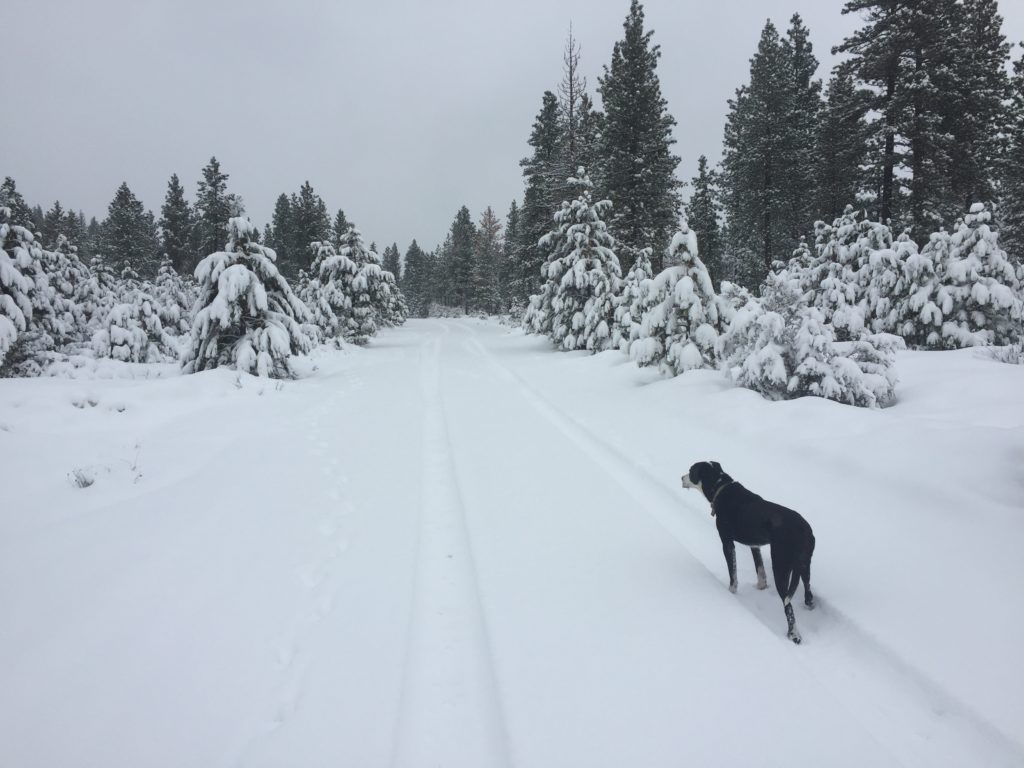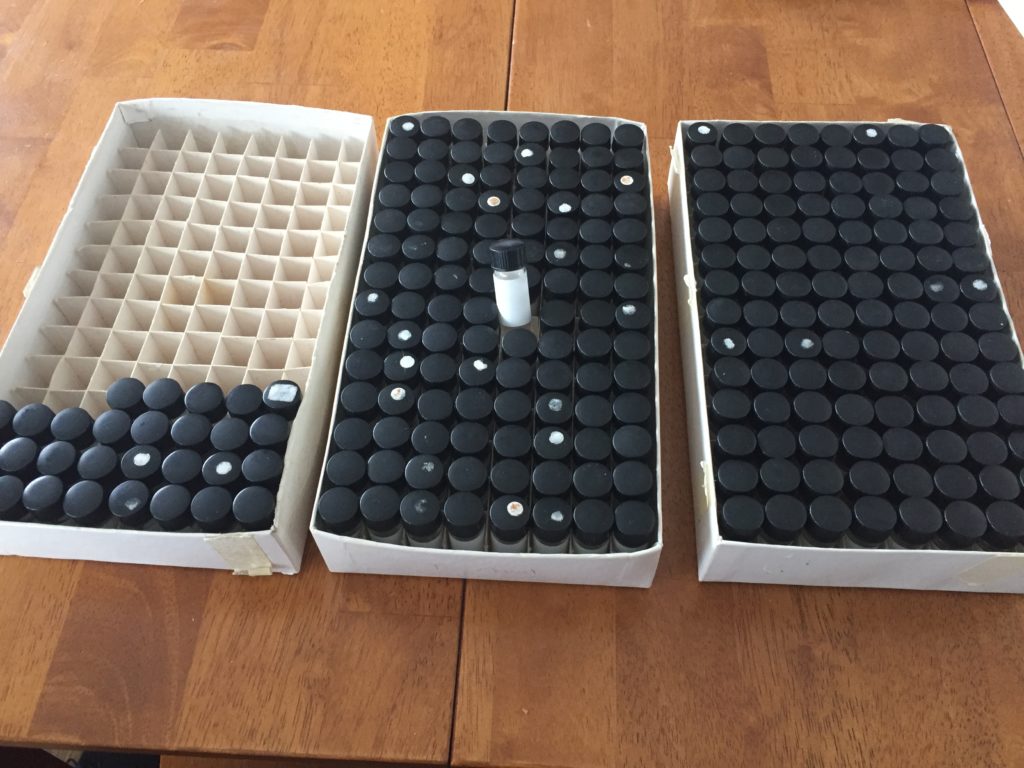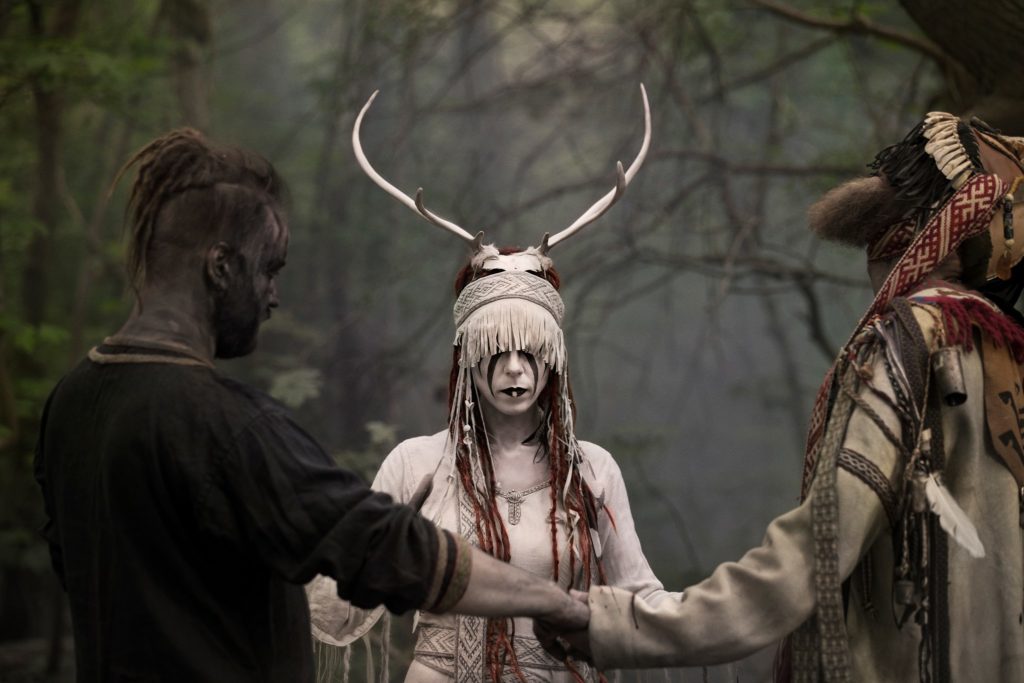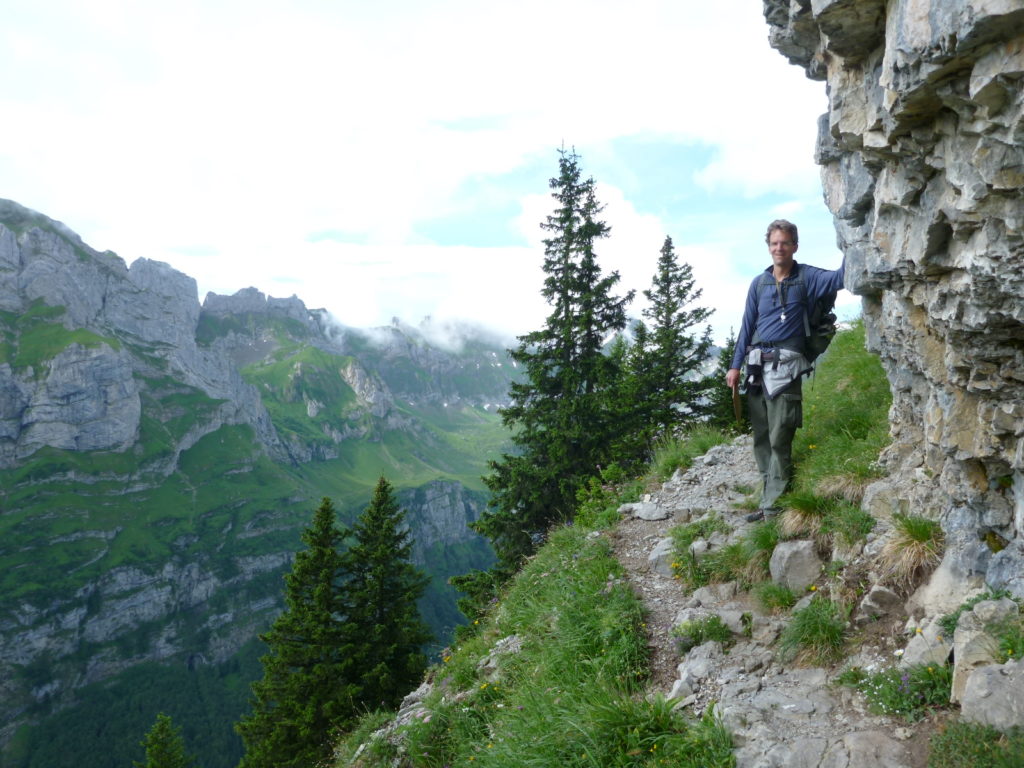
Outdoors the snow is flying and winter is stamping its authority after an unsettlingly warm January. The mountains are being energized with deep layers of snow. It’s the fourth consecutive year that our little corner of the world has had a respite from the ravages of climate change and winterless winters. My little world of aphid research has been productive since the first flakes flew in November, with one Macrosiphum manuscript finished and in press for publication in the first quarter of 2019, another Macrosiphum manuscript drafted and almost ready for submission, specimens sent to collaborators in Poland and Georgia for the beginning of a new project on Macrosiphoniella, specimens of Euceraphis measured and ready to send to England for a possible new species description, and all my major collection curation work done.

Each year my first ceremonial step in preparation for the coming collecting season is cleaning and fillings my vials and applying new labels to them. I’ve been using the same vials since 1988. And, I still remember the day that my mentor and boss Gary Reed stomped down the stairs to my lair at the research station in about 1989 and gave me the rolls of labels I still use today. He said he got them from a librarian, that they were high quality label stickers, and that the two rolls ought to last me the rest of my life. He was right. I’ve been slicing and applying those labels to slides and vials (and containers of leftovers in the freezer) for almost 30 years now.
As I contemplate another growing season and a headlong rush through another season of pursuing my aphid research, I’ve struggled with a shadow (or more) of despair about the future of humanity and the ecology of Earth. It seems inevitable that massive destruction of the Earth’s natural systems will continue for generations until it is stopped by cataclysm or alien invasion. Although each of our lives is arguably meaningless under any circumstances, this steam engine of inevitability makes it harder to convince myself of meaning or value in what I do. This winter even aphid research, my one lifelong refuge, has lost some of its ability to give me direction.
As I hike or pedal my bicycle through forests and valleys, I ponder what might help me live life with some sense of peace while accepting the inevitabilities of human-wrought climate change and ecological devastation. I’ve been blessed this winter with a few glimmers of hope for answers or at least helping hands and, with the sense of irony fully in mind, all have come to me through modern contrivances such as iPhones, Facebook, and YouTube.
Music

A couple months ago Gina heard from a friend on Facebook about a musical group from Northern Europe called Heilung (= “healing” in German) and insisted that I give them a listen. One listen on YouTube and their work connected with me in a visceral, primal way that nothing before has done. As they describe their work, “Heilung tries to connect the listener to the time before Christianity and its political offspring, that tortured and burned itself into the European mentality and culture of today. Heilung links. It links the listener to an ancient mind-set and it links people.” As a human only a few generations separated from Northern Europe, the amplified history of Heilung gives me a way to think about my ancestors beyond the faith in science to solve all human-caused problems, beyond the violence and conquest wrought by Europeans all around the world, and beyond the influence of Christianity and the idea of human supremacy that it spawned. It’s a depressing thing to look back on the past thousand years of European history and realize that it has been a story of losing touch with the natural world and a cleaving to ideas of human supremacy and the need to control everything and everyone within our influence. I think Heilung touches many of its fans because it connects us suddenly and viscerally to a past that our culture has cut itself off from. As their opening ritual says:
“Remember, that we all are brothers
All people, beasts, trees and stone and wind
We all descend from the one great being
That was always there
Before people lived and named it
Before the first seed sprouted.”
Essays
For many years I have been receiving Science magazine. I go through spells when I read it with dedication, and long periods when I just don’t muster the motivation. This week I dedicated myself to a new effort at reading it, by making it a weekly recurring item on my digital to-do list. The first issue I picked up was from 14 December 2018. In it, I was blown over the essay from Eileen Crist entitled, “Reimagining the human” (http://science.sciencemag.org/content/362/6420/1242) in which she covers the “trends of more” in terms of “(i) human population, (ii) consumption of food, water, energy, and materials, and (iii) infrastructural incursions into the natural world.” She discusses these in terms of the cultural construct she calls “human supremacy” but that might also be called anthropocentrism. She finished by saying, “The present historical time invites opening our imagination toward a new vision of humanity no longer obstructed by the worldview of human supremacy. Learning to inhabit Earth with care, grace, and proper measure promises material and spiritual abundance for all.” It’s an excellent piece; go read it.
After sharing Dr. Crist’s piece with friends and Facebook friends, the excellent 2012 essay in Orion Magazine by Paul Kingsnorth was sent to me via iMessage from thousands of miles away. Entitled Dark Ecology (https://orionmagazine.org/article/dark-ecology/), the piece bowled me over even more than Dr. Crist’s essay. In it, Kingsnorth covers several issues, including an interesting and new-to-me description and critique of what he called “neo-environmentalism.” Too much to summarize here, I urge you to go read his essay. Most important for me personally, Kingsnorth closed the essay with some admissions that I think are important: “What does the near future look like? I’d put my bets on a strange and unworldly combination of ongoing collapse, which will continue to fragment both nature and culture, and a new wave of techno-green “solutions” being unveiled in a doomed attempt to prevent it. I don’t believe now that anything can break this cycle, barring some kind of reset: the kind that we have seen many times before in human history.” And, he offers 5 ideas for what to DO in the face of this recognition; what to DO, what direction to take, has been the central conundrum of my life for a couple years now. His 5 ideas, with my favorite of his pithy sentences behind each:
- Withdraw. Withdraw not with cynicism, but with a questing mind.
- Preserve nonhuman life. How can you create or protect a space for nonhuman nature to breathe easier; how can you give something that isn’t us a chance to survive our appetites?
- Get your hands dirty. Root yourself in something: some practical work, some place, some way of doing.
- Insist that nature has a value beyond utility. Value it for what it is, try to understand what it is, and have nothing but pity or contempt for people who tell you that its only value is in what they can extract from it.
- Build refuges. Can you think, or act, like the librarian of a monastery through the Dark Ages, guarding the old books as empires rise and fall outside?
I like this list. Although I think hope is illusory and I don’t like using the word, Kingsnorth’s list gives a little hope – hope that I can find a way to better balance between despair and living this amazing life I’ve been given. I have been in withdrawal for some time. The other four items on his list are seeds for me to think about what I already do and think and how to frame those in a way that helps me move ahead positively. They also give me directions to focus my excess energy, or from which to derive energy when despair encroaches.
Gratefully accepting the ideas and vibes of Heilung, Crist, Kingsnorth, and friends with whom I discuss these things, I feel unexpectedly ready for another spring, summer, and autumn of connecting to nature through the study of aphids and the important little lives they lead.

